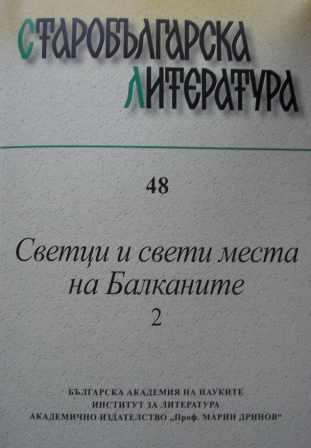Маргинален герой или творец на сакрална история? За няколко славянски текста, свързани с името на Йосиф Ариматейски
Parenthetic Hero or Creator of a Sacral Story? On Some Slavonic Texts Presenting Joseph of Arimathaea
Author(s): Małgorzata SkowronekSubject(s): Language studies
Published by: Институт за литература - БАН
Summary/Abstract: The study presents the literary creation of St Joseph of Arimathaea, the witness of the Passion, in the literary output of the Slavia Orthodoxa circle. The mediaeval Slavonic tradition does not present Joseph in a context different from this one known from the New Testament, but completes it with numerous details unknown from the canonical writings. The oldest pseudo-epigraphic source preserved in the Slavonic culture and most original one, in which Joseph is mentioned, is the Nicodemus Gospel. Chapters 12–16 are dedicated to the imprisonment of Joseph by Jews and releasing him by Christ, who transfers him to his native Arimathaea. The Story of Joseph, Who Burried Our Lord’s Body (Narratio Iosephi de Arimathaea, BHG 779r) is a secondary text, that uses extensive fragments of the Nicodemus Gospel as a base for the compilation. The oldest copy of its Slavonic translation derives from the Middle-Bulgarian period, however it’s not easy to judge its popularity and spread it obtained, although one could assume that it was probably smaller than this of the Nicodemus Gospel. The narrative led by Joseph himself is applied as a frame for the story of Christ’s passion, as well for other genres – such as angels’ letter about Christ, visions, thoughts of the Good Thief. Among narrative texts, the Story of the righteous Joseph by Priest Puncho (18th cent.) occupies a special place. The story is limited to Joseph’s conversation with Pilate, but its main part features the speech of Joseph, who is begging for the Lord’s body. The Story of Burying Christ’s Body and of Joseph of Arimathaea and of Nicodemus by Epiphanius of Cyprus deserves a special attention among the relevant homiletic works. It has been translated twice into Slavonic (around the 10th cent.). The text, particularly popular in Russia, used to be read on Easter Saturday and on the Sunday seven weeks after Easter. Epiphanius (and his Slavonic translators) presented Joseph’s speech to Pilate with a real mastery. The East Slavonic tradition contains some texts modeled after Latin and Polish Passions. Usually they do not deviate from the Bible account, but amplify some motifs related to Joseph, like the conversation with Pilate or his lamenting and mourning. In one of them, Joseph is named ‘Apostle’. The liturgical poetry, too, do not differ the New Testament account. The study is accompanied by the edition of the Story of the righteous Joseph by Priest Puncho according to four copies from manuscripts: NBKM 693, NBKM 722, CIAI 232 and NBKM 726.
Journal: Старобългарска литература
- Issue Year: 2013
- Issue No: 48
- Page Range: 165-195
- Page Count: 31
- Language: Bulgarian

